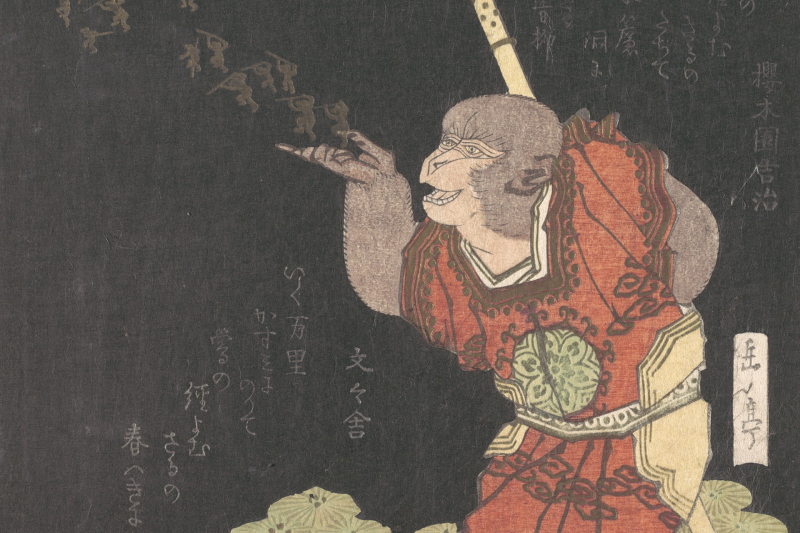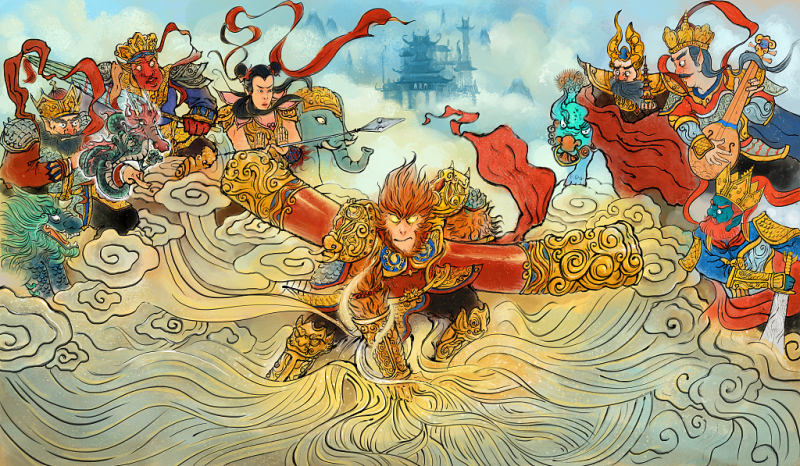The Monkey Myth
Monkey King, also known to Chinese old and young as Xi You Ji (Journey to the West), is a well-known classical Chinese tale from four hundred years ago. Monkey King is based on the historical story of a great Chinese Tang Dynasty monk named Xuan Zang (602-664). He arrived on foot in what is now India, the birthplace of Buddhism, after a decade of difficulties and tribulations. He was looking for authentic Buddhist holy scriptures. When Xuan Zang returned, he translated the Sutras into Chinese, making a significant contribution to the growth of Buddhism in China.
With Chinese fables, fairy tales, folklore, superstitions, common beliefs, monster stories, and whatever else the author could uncover in the Taoist, Buddhist, and Chinese popular faiths, Monkey King is an allegorical depiction of the journey. While most reviewers concur that the protagonist symbolizes what the author sought to express to his readers - a rebellious attitude against the then-untouchable feudal rulers - average readers are attracted by the skill and wisdom of the Monkey King.
The monkey is indeed defiant. According to legend, he was born from a rock and fertilized by the favor of Heaven and Earth. He learned all of the magic skills and gongfu from an immortal Taoist teacher, and he is highly brilliant. He may now morph himself into 72 various pictures, such as a tree, a bird, a beast of prey, or an insect, and sneak into an enemy's body to battle him or her from within. He can fly 108,000 miles in a single somersault using clouds as a vehicle.
In defiance of the only authority over the heavens, seas, earth, and subterranean realm, he claims to be The King. That act of grave treason, combined with protests from the masters of the four seas and Hell, brings the heavenly army's merciless scourge. In truth, the monkey has fought his way into the ocean and taken the Dragon King's greatest treasure: a massive gold-banded iron rod used as a water ballast. The iron rod, which can grow and contract at will, becomes the monkey's favorite weapon in his later exploits. The monkey stormed into hell and threatened the Hadean monarch into sparing his and his followers' mortal lives so that they may all experience eternity. This was the first time the power of the monkey was put to the test.
The celestial army has suffered countless humiliating defeats after numerous clashes with the courageous Monkey King. The celestial monarch only needs to give the dove side a chance to try their conciliatory technique of bestowing an official title in heaven with minimal authority on the monkey. When he realizes he is nothing more than a laughingstock, the infuriated monkey revolts, fighting his way back to earth to reclaim his rightful place as The King.
Finally, the heavenly army succeeds to capture the just about unstoppable monkey with the aid of all the god warriors and their various skills. He has been given the death penalty. However, every execution strategy fails. The monkey blunts numerous swords that are thrust upon him because of his bronze head and iron shoulders. The emperor orders that he be burned alive in the furnace where his Taoist minister Tai Shang Lao Jun refines his immortality tablets as a final option. The flames and smoke therein didn't kill the monkey; instead, they enhanced his vision, enabling him to see through things that others cannot. He battles his way back down to earth.
At his wits' end, the celestial ruler seeks assistance from Buddha. Buddha imprisons the monkey beneath Wu Zhi Shan, a massive mountain (The Mount of Five Fingers). The tenacious monkey withstands immense weight and pressure. Five hundred years later, the Tang Monk, Xuan Zang, whom we mentioned at the beginning of the story, comes to his aid.
Buddha has made arrangements for Monkey King to serve as the monk's escort in his position as his student in order to ensure that the monk can travel to the West in order to obtain the Sutras. Two additional disciples soon join them on their journey to the west, both at the Buddha's command. One is the amusing and brave pig that a drunken heavenly general transgressed for attacking a fairy, and the other is a sea monster that was once a celestial general but is now exiled for a misdemeanor.
The party of four was bolstered by a horse, an incarnation of a dragon's son, as they embarked on a stormy voyage to the West -a journey packed with acts and adventures that demonstrated the power of the monks' students, particularly Monkey King.
















